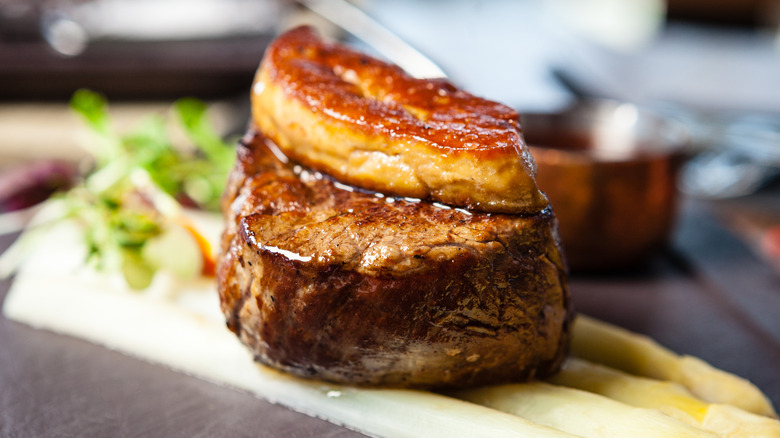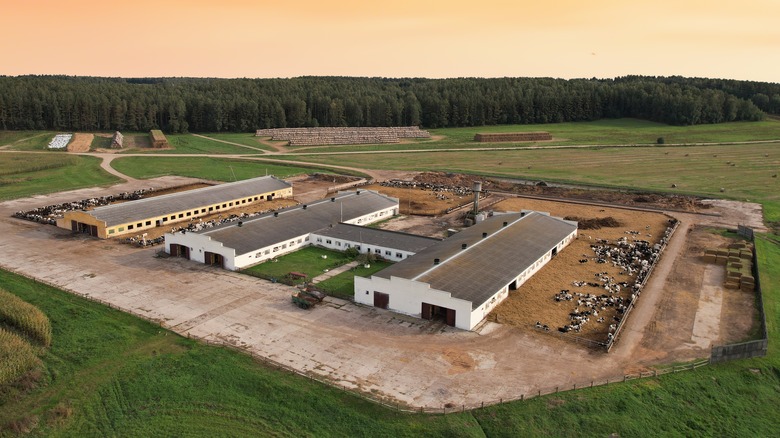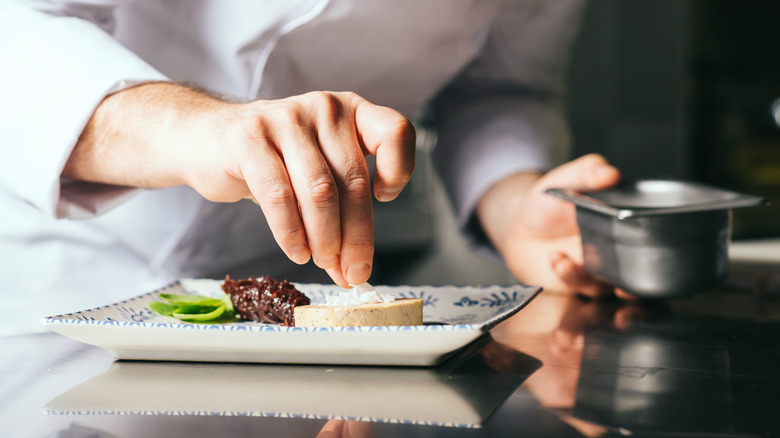Why New York's Foie Gras Ban Is Being Delayed
Nutritious, expensive, and controversial. Meet foie gras — the dish even Encyclopedia Britannica calls a "delicacy." Foie gras is a French dish served roasted, pan-fried, baked into a crust, or pureed with white wine into a pâté. Healthline describes it as fatty, velvety, buttery, and rich, yet high in vitamins. In a 28-gram serving of foie gras, three of those grams are protein, and 12 are fat. Over a day's worth of the recommended value for vitamin B12 is in there, too.
If you want to buy a lobe of flash-frozen foie gras online, it'll cost you $85.77 per pound (via Gourmet Foodstore). So, what is it, after all? That's the kicker. If you haven't already heard of it, foie gras is goose or duck liver that has been fattened up to 10 times its natural size while the animal is still alive by force-feeding, per Healthline.
In 2006, Chicago became the first city ever to ban foie gras, but it lifted the ban two years later. California banned foie gras in 2012, according to ABC News, but lessened the ban earlier this year to allow the purchase of foie gras produced out of state, delivered by a third-party service, and bought for personal use. Now, New York is next in line to ban the dish — or, it was. Here's why the Empire State's foie gras ban is being delayed.
A matter of farmers' rights
In 2019, New York's City Council passed an animal welfare bill that included restrictions on horse-drawn carriages and banned the sale of foie gras, per Eater. To minimize fallout to restaurants and farmers (and their employees), the bill was to be enacted after a three-year grace period, which was supposed to end on November 25 of this year. Then, last week, two New York duck farms (La Belle and Hudson Valley Foie Gras) challenged the bill and convinced the Supreme Court of New York to issue an injunction postponing the ban until the farms' lawsuit officially reaches a verdict (via Food & Wine).
The farms argue that the bill prompts an issue for independent businesses in the agricultural sector. Collectively, La Belle and Hudson Valley Foie Gras employ roughly 400 workers. Indeed, when New York first announced the ban in 2019, Eater noted, "Foie gras hasn't been a huge part of menus at new restaurants in New York for a while; many chefs now use it sparingly, if at all. Instead, the biggest impact will be for upstate farmers and meat distributors." Now, this prediction might be playing out on a very real scale for many businesses.
Animal rights versus fine gastronomy
Of course, this workers' rights issue comes in addition to the conflict between animal rights versus the culinary world. Public figures have different stances on the matter. In one episode of his first television show "A Cook's Tour," New York-native Anthony Bourdain visits an award-winning family-owned foie gras farm in France, commenting, "I've been ordering this stuff up for years. It's only fair that I see the process from beginning to end." Yet, of the experience and the dish, Bourdain says, "Some may argue that this is cruel, but foie gras is a precious delicacy. At the end of the day, you taste that liver, and realize it's all means to an end."
Still, small-scale humane farms like the one depicted in the episode are not universal. PETA writes that, on many industrial foie gras farms, animals are subjected to a plethora of horrendous physical effects from force-feeding and rapid production pace. So should foie gras be banned, or is it a culinary delicacy that should be allowed to exist in moderation? Time will tell what the state of New York decides.


